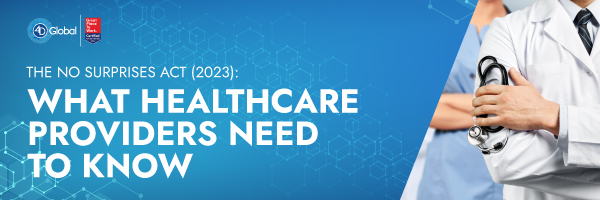
The No Surprises Act (2023)
The No Surprises Act changed various areas of healthcare billing to reduce patients’ unexpected medical bills. Many individuals receive care from physicians that are outside the networks of their health insurances without their knowledge, incurring costs that were greater than they had anticipated. Given that Americans owe more than $195 billion in medical debt and that many households could not afford a $2,000 medical bill, this rule might have a significant impact.
Requirements for healthcare facilities and providers continue to apply
- Out-of-network emergency services are not subject to balance billing.
- No balance billing without permission for non-emergency services provided at specific participating healthcare facilities.
- There will be no balance-billing for non-participating providers for air ambulance services.
- Inform patients about balance billing safeguards.
- Provide self-pay patients with good faith estimate of services.
- Anticipated fees or costs for each good or service provided by each provider and facility.
- A warning that if the actual charges are higher than the good faith estimate.
- Details on how to challenge your bill if it is at least $400 greater than the good faith estimate you got from any service or institution.
Which Services Are Affected
The No Surprises Act forbids balance billing for non-emergency services provided at participating healthcare facilities without consent. As per the Act, healthcare facilities are hospitals, hospital outpatient departments, critical access hospitals, and ambulatory surgery centers.
The Cost of Independent Dispute Resolution
Administrative fees owed from each party will rise from $50 to $350 per party as of January 1, 2023, coupled with IDR (Independent Dispute Resolution) entity fees for both single and batch determinations. While single determination fee is increased from $200-$500 (2022) to $200 – $700 (2023) and Batch determination fee is increased from $268-$670 (2022) to $268-$938 (2023)
Between April 15 and September 30, stakeholders started 90,078 disputes through the federal IDR portal, 23.107 (26%) of the 90,078 conflicts that were started were resolved by September 30, 2022. The study lists the following grounds for closure
- The 15% payment threshold was reached.
- 69% of disputes were determined to be ineligible.
- 16% contribute as withdrawn, outside settlement, submission errors, etc.
Disputes involving both emergency and non-emergency items or services involved over 600 different non-initiation parties. A quarter of the disputes were represented by United Healthcare. In 85% of all conflicts involving emergency and non-emergency services, ten insurance companies were the non-initiating party.
